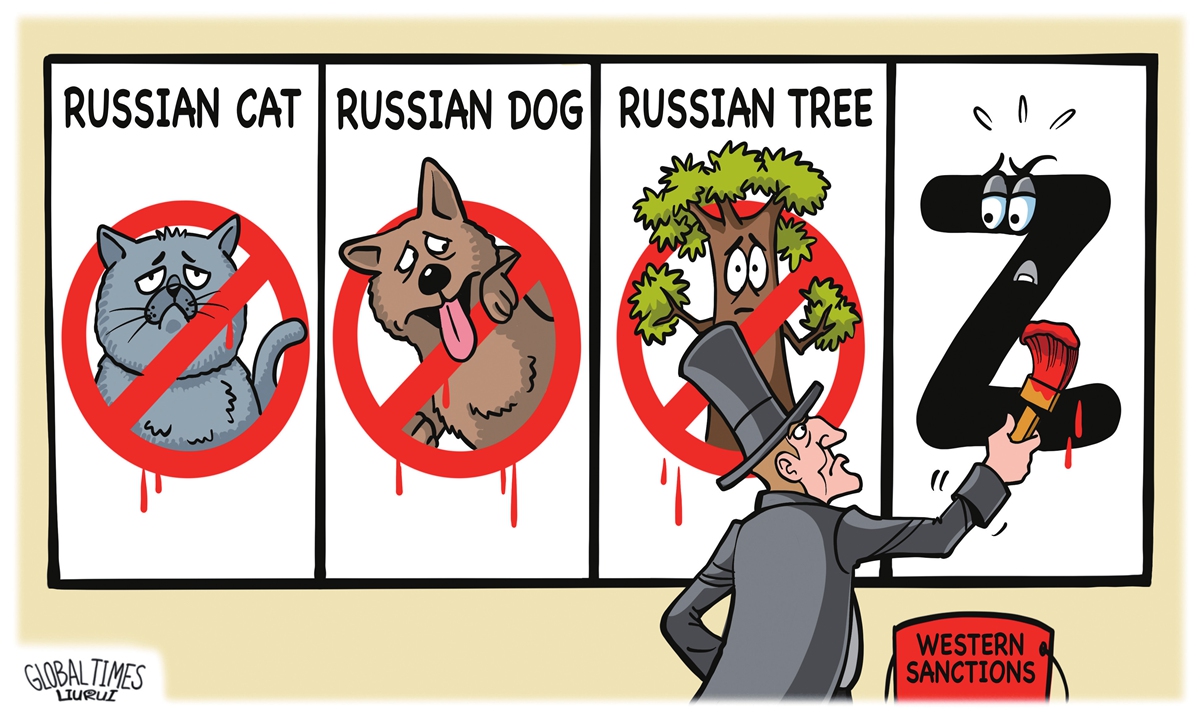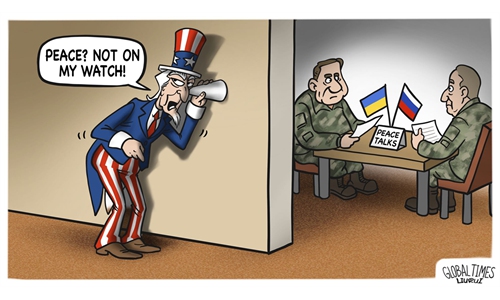
Russophobia Illustration: Liu Rui/GT
Unilateral sanctions have always been one of the most favored tools in Uncle Sam's toolbox to serve his hegemonic interests. Since 2014, the US has rallied its allies and partners and imposed 8,068 sanction designations on Russia. Since the Ukraine crisis broke out, 5,314 new sanction designations have been imposed.Every time the US acts unilaterally, the only calculus is its own strategic goal of suppressing its rival. It has every faith in its own might, in defiance of international laws and rules, moral principles, or harmful consequences that its actions might cause to others.
US sanctions against Russia are illegal and are unilateral moves unauthorized by the United Nations. The US chose to circumvent the UN because it believed that its fists were big and strong enough. Paying no attention to the multilateral trading system, the US put domestic law above international law, abused long-arm jurisdiction and economic sanctions against Russia, Iran and the DPRK, which seriously damaged the fair and just international trade environment. Just as Brazilian Foreign Minister Carlos Franca straightly put forward, unilateral measures against Russia are "illegal under international law." The US is bringing the world back to the era of a lawless jungle.
US sanctions expose its hypocrisy. Everything from Russian leaders, elites, finance, economy, trade, military, science, arts, sports and even animals have been targeted by unprecedented sanctions. Chelsea Football Club, owned by Russian billionaire Roman Abramovich, was forced to be put up for sale. The US and its allies even confiscated the assets and property of Russian nationals stored overseas. It is an outright "betrayal" of the values the West has long championed - that individual property is an inviolable and sacred right. It is nothing but plunder and robbery.
US sanctions bite more than they are designed to. Gita Gopinath, first deputy managing director of the International Monetary Fund, told the Financial Times that US financial sanctions against Russia threaten to gradually dilute the US dollar hegemony and result in a more fragmented international monetary system. According to Andrew Milligan, a former UK Treasury official, sanctions may lead to slightly lower corporate profits in the US, and its growth might be 0.25 percent to 0.5 percent lower than it would have been otherwise over the next year.
Worse still, most developing countries that are not party to the current conflict are also suffering collateral damage and paying a price. The unilateral sanctions have caused serious disruptions to the global supply chain and drove up the price of commodities and food. India has already found itself impacted by US sanctions against Russia. As Gateway House Indian Council on Global Relations suggested, the US is increasingly using sanctions as a geopolitical tool against rivals, including Russia, Iran and Venezuela, all important partners for India. Franca also pointed out that "developed countries are shielding themselves from the worst of consequences" brought by unilateral sanctions against Russia, which affect the basic needs of a large part of the world's population. Walter Russell Mead, an American academic, cautioned the trend when he wrote in the Wall Street Journal that sanctions on Russia pit the West against the rest of the world.
Ironically, Washington imposed strict sanctions in sectors where US firms are major competitors of Russia while ignoring those where the US is heavily dependent on Russia, for example, titanium, a metal indispensable in the manufacturing of aircraft and rocket engines. According to Russian Security Council Deputy Secretary Mikhail Popov, the US allowed its companies to import mineral fertilizers from Russia, while other countries, especially those whose harvests will count on these fertilizers this spring, were prohibited from acquiring Russia's potash fertilizer. These are examples of American selfishness and double standards.
US President Joe Biden once threatened that there were only two options: sanctions against Russia, or a Third World War. But he fails to realize that dialogue and peace talks are the only way out of the crisis.
The author is a commentator on international affairs, writing regularly for CGTN, Global Times, Xinhua News Agency, etc.. He can be reached at xinping604@gmail.com



